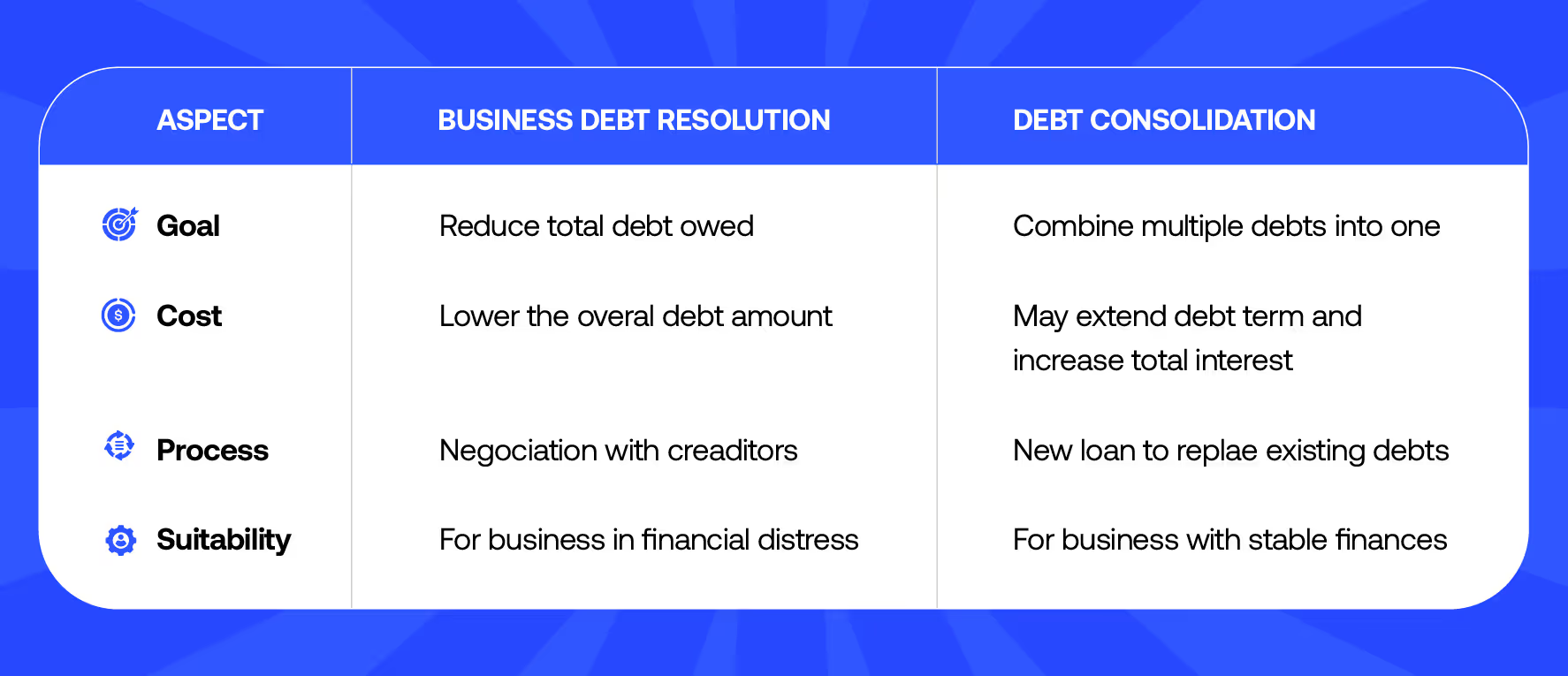
Introduction
Debt is a common part of running a business, but when it becomes overwhelming, it can threaten your company's stability. That’s where business debt resolution comes in—a process designed to help businesses regain control of their finances by negotiating better terms with creditors or settling debts. In this guide, we’ll explain what business debt resolution means, how it works, and how it can help your business achieve financial stability.
What Is Business Debt Resolution?
Business debt resolution is the process of working with creditors to reduce the total amount owed or renegotiate payment terms. Unlike debt consolidation, which combines multiple debts into a single loan, debt resolution focuses on settling existing debts, often for less than the original amount.
Key Features of Debt Resolution
- Focus on Reduction: Aims to lower the total amount owed.
- Negotiation with Creditors: Works directly with creditors to achieve better terms.
- Custom Plans: Tailored to a business’s unique financial situation.
How Does Business Debt Resolution Work?
Debt resolution typically involves partnering with a debt relief specialist who manages the negotiation process. Here’s how it works:
- Financial Assessment:
The process begins with a deep dive into your business’s financial health, including cash flow, debts, and obligations. - Negotiation with Creditors:
A debt specialist negotiates with creditors to reduce the total amount owed, adjust interest rates, or extend repayment terms. - Debt Settlement Agreement:
Once an agreement is reached, payments are made according to the new terms. - Business Recovery:
With reduced debt, businesses can focus on rebuilding financial stability and growth.
Benefits of Business Debt Resolution
- Reduce Debt Amounts:
Debt resolution often results in paying significantly less than the original amount owed. - Avoid Bankruptcy:
Provides an alternative to bankruptcy, protecting your business's reputation and operations. - Improve Cash Flow:
Eases cash flow pressure by reducing or restructuring debt payments. - Minimize Stress:
Relieves the burden of dealing with creditors directly.
When Should You Consider Business Debt Resolution?
Business debt resolution might be right for you if:
- Cash Flow is Strained: You’re struggling to cover operational expenses due to high debt payments.
- Creditors Are Pressuring You: Frequent calls or threats of legal action are a sign that debt resolution may be necessary.
- High-Interest Debt is Unmanageable: Products like merchant cash advances (MCAs) with high fees are draining your resources.
Common Causes of Business Debt
Understanding why your business is in debt can help you avoid future financial strain. Some common causes include:
- Irregular Cash Flow: Seasonal income fluctuations or delayed client payments.
- Over-Expansion: Taking on debt for rapid growth without sufficient planning.
- High-Interest Loans: Products like MCAs or credit cards with steep interest rates.
- Economic Downturns: Market shifts or unexpected events, like the COVID-19 pandemic.
Business Debt Resolution vs. Debt Consolidation
It’s important to distinguish between these two options:

How Coastal Debt Resolve Can Help
At Coastal Debt Resolve, we specialize in helping small businesses escape overwhelming debt, especially high-interest loans like merchant cash advances. Here’s what we offer:
1. Tailored Debt Relief Plans
We assess your financial situation and create a plan designed to fit your business’s needs.
2. Professional Negotiations
Our team works directly with creditors to secure better repayment terms or reduce the total debt amount.
3. Focus on MCA Debt
Merchant cash advances often have some of the most challenging repayment terms. We specialize in resolving MCA debt to provide immediate financial relief.
4. Ongoing Support
We guide you through the debt resolution process and offer strategies to prevent future financial challenges.
Conclusion
Business debt resolution is a powerful tool for small businesses facing financial strain. By negotiating with creditors and reducing debt, this process helps businesses regain stability and focus on growth. If your business is struggling with high-interest debt, especially MCAs, Coastal Debt Resolve is here to help. Our tailored solutions can alleviate financial pressure and set your business on the path to success.
Call to Action
Take the first step toward financial freedom today. Contact Coastal Debt Resolve for a free consultation and learn how our expert team can help you resolve your debt and rebuild your business.
Disclaimer: The information provided in these materials is for general informational purposes only and is not intended as legal or financial advice. While we strive to ensure that the content is accurate and up-to-date, it should not be relied upon as a substitute for legal advice. Performance information may have changed since the time of publication. Past performance is not indicative of future results.
Frequently asked questions
While there may be some impact, it’s typically less severe than defaulting or filing for bankruptcy.
Startups with no credit history may find MCAs easier to access, but the high costs make small business loans a better long-term choice if available.
The timeline varies but is generally faster than other options like debt consolidation or bankruptcy.







